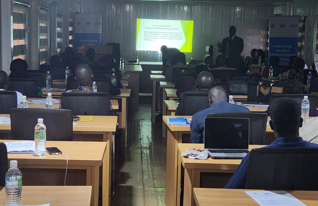The National Constitution Review Commission (NCRC) on Wednesday revealed that it has completed preparations to begin collecting citizens’ views across South Sudan as part of the permanent constitution-making process.
Speaking during a three-day briefing workshop for the committee members in Juba, Oyet Patrick Charles, Chairperson of Civic Education and Public Consultations Committee of the NCRC, said the commission had finalised the orientation of its teams, who are expected to begin fieldwork in early October.
“We are here today to do a final briefing for our members who are going to start collecting data,” he stated. “This data will be used in the constitution drafting.”
According to Oyet, the first deployment will cover Eastern Equatoria, Lakes, Western Bahr el Ghazal, and Northern Bahr el Ghazal states, with 27 staff, including commissioners, secretaries, and media officers, spending a month engaging citizens at the county level.
He admitted the process was delayed due to financial constraints but insisted the commission is on track to meet the 2026 transitional deadline.
“According to our schedule, we are still able to deliver a constitution before 2026. The preparatory work is finished; now it is just going to the field, collecting the data, and then drafting,” he assured.
For her part, Jackline Nasiwa, Executive Director of the Centre for Inclusive Governance, Peace and Justice, stressed the importance of preparing commissioners before deployment.
“This has been the culture of the commission from way back that before they are deployed, there is a refresher for all the commissioners so that there is uniform messaging,” she said.
Nasiwa said the training will equip members with civic education tools, manuals, and simulation exercises to ensure consultations are well-coordinated and reflective of citizens’ views.
Meanwhile, UN Women also reaffirmed its support for the process. Korti William, Acting Deputy Country Representative of UN Women in South Sudan, praised the NCRC for progress made since its reconstitution in 2023.
“Public participation is a critical element of the modern constitution-making process that supports popular ownership and national consensus,” William emphasised. “Women, youth, and persons with disabilities should be enabled to play a variety of roles… This is not a favour, it’s actually an obligation.”
William concluded that UN Women remains committed to supporting a gender-responsive, people-driven constitution that guarantees equality for all South Sudanese.




